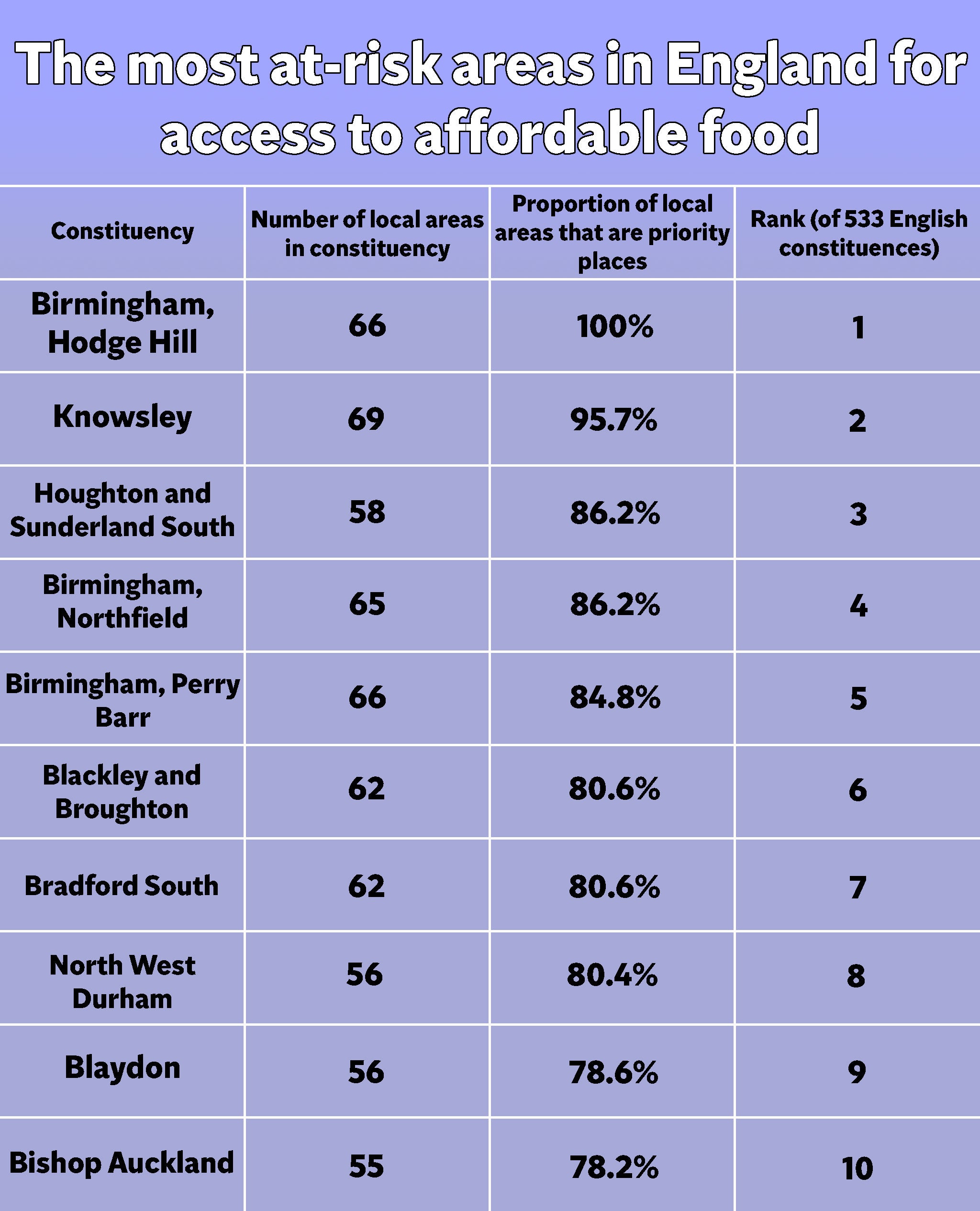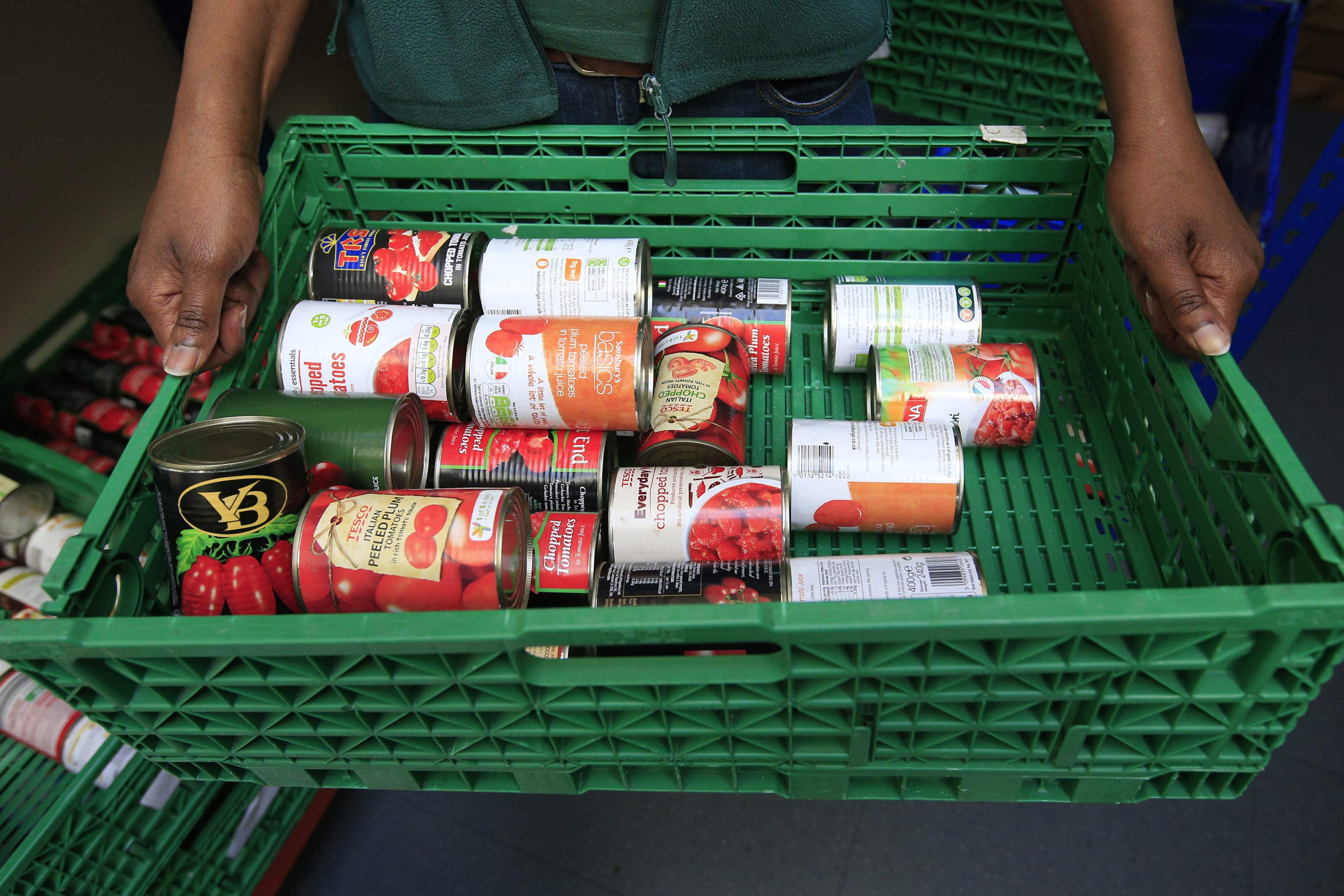
Consumer watchdog Which? has revealed the top 30 areas in the UK struggling to access affordable food during the cost of living crisis.
Communities in Birmingham, Merseyside and Sunderland are among those where people have been worst hit by the rising cost of groceries.
In a report published on Tuesday, Which? called on supermarkets to do more to help customers through the squeeze on their incomes.
Drawing up a 10-point plan, the consumer group said supermarkets must ensure shelf prices are easy to understand.

It also called on supermarkets to make healthy budget lines widely available and provide targeted promotions to support people in areas that are struggling the most.
Factors such as low income, poor access to affordable food, having no large supermarkets nearby and a lack of online shopping deliveries contributed to making it difficult for people to find healthy and affordable food, the watchdog warned.
It has drawn up a ‘Priority Places for Food Index’ with Leeds University to rank local areas according to the likelihood of people needing support.
According to the index, England’s North East is the worst impacted, with 45 per cent of local areas “in dire need of extra support” because of relatively poor access to online shopping deliveries.
People there were also less likely to live close to supermarkets and have a higher reliance on food banks and were more likely to be eligible for free school meals and take up healthy start vouchers.
Yorkshire and the Humber, the West Midlands and the North West were all home to a third of local areas that were especially in need of extra help, according to Which?
Constituencies in Birmingham and Liverpool feature heavily at the top of the index, with all Birmingham Hodge Hill communities in need of extra support.
Which? found the area has poor online delivery access, high levels of fuel poverty and residents with lower incomes or no car access. One volunteer at a local food bank reported that there was no supermarket within two miles.
Knowsley, in Merseyside, is the second highest-ranking constituency for needing support, according to Which? analysis, with low income, fuel poverty and an “exceptionally high need” for family food support in 96 per cent of its local areas.

It also has half the number of large or very large supermarkets compared to the national average, indicating affordable food may be harder to find.
The index suggests that overall, seven in 10 UK parliamentary constituencies have at least one area in need of urgent help to access affordable food – but there are 16 constituencies across England and Wales for which at least three-quarters of the constituency are at risk.
In Wales, Which? found the South Wales valleys had the highest concentration of areas at high risk during the food crisis, where proximity to a large supermarket or access to online deliveries may be very poor.
Wales also had a higher proportion than England and Scotland of rural areas where accessing affordable food was an issue.

In Scotland, the places in highest need of support were in the Central Belt, but there was also a notable concentration in and around Dundee, where there was poor access to online food deliveries and people were more likely to live in fuel poverty and be on a low income.
Northern Ireland had the most even geographical spread of areas in need. However, there was a greater concentration in parts of southwest Belfast and in and around Derry/Londonderry.
Sue Davies, Which? head of food policy, said: “We know that millions of people are skipping meals through the worst cost-of-living crisis in decades but our new research tells us where around the UK support is most urgently needed.
“The supermarkets have the ability to take action and make a real difference to communities all around the UK. That’s why we’re calling on them to ensure everyone has easy access to budget food ranges that enable healthy choices, can easily compare the price of products to get the best value and that promotions are targeted at supporting people most in need.”
Michelle Morris, associate professor of nutrition and lifestyle analytics at the University of Leeds, said: “With so many people in the UK already suffering from food insecurity and the cost-of-living crisis making that much worse, we need to do all that we can to support those most in need to access affordable, healthy and sustainable foods.”
The report comes less than a week after the Bank of England hiked interest rates by 0.75 per cent to 3 per cent, increasing the cost of borrowing and some mortgages for homeowners.
Government support is available to help people through the cost of living crisis. You can read about all the help available here.
Top 30 areas most in need of help
Birmingham, Hodge Hill: West Midlands
Knowsley, Merseyside: North West
Houghton and Sunderland South: North East
Birmingham, Northfield: West Midlands
Birmingham, Perry Barr: West Midlands
Blackley and Broughton: North West
Bradford South: Yorkshire and The Humber
North West Durham: North East
Blaydon: North East
Bishop Auckland: North East
Birmingham, Yardley: West Midlands
Bolsover: East Midlands
Birmingham, Hall Green: West Midlands
Don Valley: Yorkshire and The Humber
Bradford West: Yorkshire and The Humber
Liverpool, West Derby: North West
Wolverhampton North East: West Midlands
Bradford East: Yorkshire and The Humber
Easington: North East
South West Norfolk: East
Birmingham, Erdington: West Midlands
Rochdale: North West
St Helens South and Whiston: North West
Barnsley East: Yorkshire and The Humber
Louth and Horncastle: East Midlands
Huddersfield: Yorkshire and The Humber
St Ives: South West
Sheffield, Brightside and Hillsborough: Yorkshire and The Humber
Wolverhampton South East: West Midlands
Doncaster North: Yorkshire and The Humber







